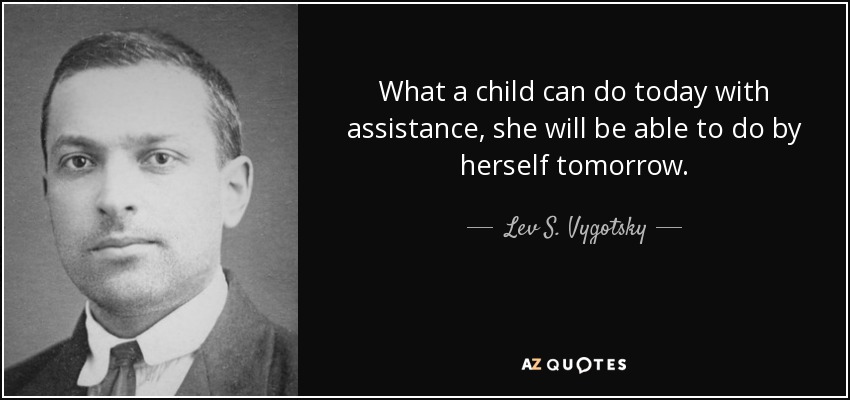Module 2 Blog Post – Learner Development
February 22nd, 2017
“People develop at different rates, development is relatively orderly, development takes place gradually.” (Woolfolk, p. 36). Each one of these principles are key components of learner development. However, there are a few theorists (Piaget, Vygotsky, Erikson, and Bronfenbrenner) whose ideas and concepts of a child’s learning development are similar in a sense yet different at the same time. Piaget’s and Vygostky’s beliefs and ideas on social and cognitive development will be discussed throughout this blog.

Retrieved from https://www.google.com/search?q=learner+development&biw=1366&bih=662&source=lnms&tbm=isch&sa=X&ved=0ahUKEwj6puiAu6TSAhUEsVQKHesDCFgQ_AUIBigB#imgrc=j1PdsduChsYOpM:
Piaget had four stages of cognitive development which were sensorimotor, preoperational, concrete operational, and formal operational. He believed every child passes through each one of these stages throughout his/her lifetime. While each one of these stages relates to a child’s understanding of learning development, children may or may not ever go through each one of these stages. As discussed in class, Dr. Weber has a young child at home in which she not only is in the preoperational stage but also in the concrete operational stage in her life. While Dr. Weber’s daughter understands concepts of conservation (i.e. having the same amount of coins in both rows regardless of how spread out they are), she might not understand the concept of having the same amount of water in two glasses then taking that same amount of water and pouring it into a wider/taller glass.While some children do in fact go through each stage, some children learn better and/or excel or skip some stages of Piaget’s theory of development based on their learning capabilities.
This is vital to understand when it comes to teaching because as a teacher, you are responsible for understanding each and everyone of your student’s learning abilities in order to teach at an effective level for all students.
“We develop because we learn.” (PowerPoint, 2017). Vygotsky believed that culture and the social processes are what affected a child’s learning more greatly. He came up with the idea of the zone of proximal development in which is “the area between the child’s current development level and the level of development that the child could achieve through adult guidance or collaboration with more capable peers.” (Woolfolk, p. 67). This can impact a child’s learning and well as the teachers instruction greatly. While having the child focus best on what he/she can accomplish individually then gradually assisting in ways in ways that will benefit the child’s understanding is an important concept of successful teaching. Being aware of the different types of learning development that you have in your classroom is key in becoming an outstanding teacher.

Retrieved from https://www.google.com/search?q=learner+development&biw=1366&bih=662&source=lnms&tbm=isch&sa=X&ved=0ahUKEwj6puiAu6TSAhUEsVQKHesDCFgQ_AUIBigB#tbm=isch&q=vygotsky&imgrc=3bq-OO_OU5De3M:
Parenting styles are also extremely significant when it comes to a child’s behavior and feelings. While there are four types of styles, authoritative, authoritarian, permissive, and rejecting/neglectful, each one of these styles can create a major impact on a child’s learning development and behavior. By having parents whom are authoritative (high warmth, high control) children can benefit by understanding his/her consequences by each action made. Having parents who set high rules and limits however, guide their children into the “right” direction by discussing the results of each action made, will help the student understand the importance of positive decision making. Children of authoritative parents tend to do well in school and feel more confident in themselves and relate to others better. As a teacher, it is important to remember that all students however, do not come from authoritative parents. By treating each child in the same manner will benefit your teaching strategies greatly and you will in turn, gain a better knowledge of how parenting styles can greatly impact a child’s learning. A video to better understand the different types of parenting styles and how they can impact a child’s behavior and development is linked below:
(Bano, 2015).
As a future teacher, understanding different types of learner development and parenting styles and how social and cultural processes can impact a child’s learning is vital to bring to the classroom. Each theory and idea discussed comes together to not only develop the child’s learning development but to mold you into a better teacher. Having the knowledge that all students develop at different rates and that development is gradual will help you plan and create a learning environment specifically designed towards your students capabilities.
References
Woolfolk, A. (2014). Educational psychology: Active learning edition. (12th ed.). Pearson.
Weber, N. (2017). Educational psychology: Module 2: Learner Development (2/9). PowerPoint. Retrieved from https://uww.courses.wisconsin.edu/d2l/le/content/3643387/viewContent/22679044/View
Bano, A. (2015). Parenting styles and their influence on children. YouTube. Retrieved from https://www.youtube.com/watch?v=SZ2Hw2_hiK8
Entry Filed under: Uncategorized
Leave a Comment
You must be logged in to post a comment.